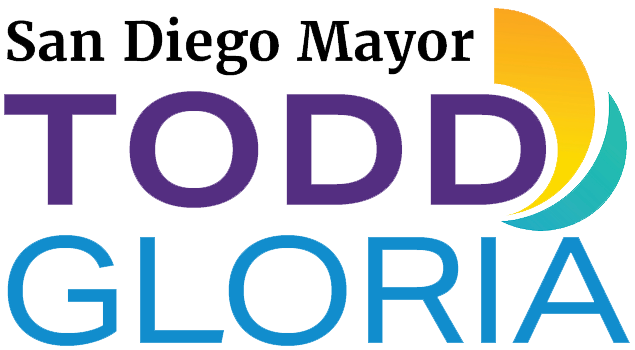Mayor Gloria Announces New Funding Awards for Bridge to Home Program
FIVE PROJECTS PROPOSING 400 NEW AFFORDABLE HOMES RECOMMENDED FOR $15.4 MILLION IN ROUND 3 OF CITY’S BRIDGE TO HOME PROGRAM
FOR IMMEDIATE RELEASE
November 28, 2023
CONTACT:
MayorPress@sandiego.gov
SAN DIEGO – Mayor Todd Gloria announced today that five affordable housing projects have been recommended to receive a total of $15.4 million in City funding under the Bridge to Home initiative, which helps get shovels in the ground more quickly by providing gap-financing assistance.
The five projects are proposing to create a total of 400 new affordable homes in five different City Council districts. Of the 400 homes, 96 would be set aside as permanent supportive housing for San Diegans experiencing homelessness.
“With our innovative Bridge to Home program, the City is investing directly in affordable housing projects to address homelessness and provide homes that low-income individuals, families, and seniors can afford,” Mayor Todd Gloria said. “Through three rounds of Bridge to Home funding, we’re helping build more than 1,300 affordable homes in neighborhoods all across the city, from Rancho Bernardo to San Ysidro.”
In August, Mayor Gloria announced the availability of up to $20 million for Round 3 of Bridge to Home, which was launched in 2021 as part of the Mayor’s comprehensive strategy to spur creation of more affordable homes across the City of San Diego.
The following new projects have been recommended for funding:
- Hillcrest Hall – CRP Affordable Housing and Community Development proposes 97 affordable homes for families plus one manager’s unit in Hillcrest. Ten of the homes would come with supportive services. Award recommendation: $3.175 million.
- Humble Heart – Wakeland Housing and Development Corporation proposes 72 affordable homes for families plus one manager’s unit in City Heights. Thirty-three of the homes would come with supportive services. Award recommendation: $1.23 million.
- Palm City Transit Village – National CORE proposes 78 affordable homes for families plus one manager’s unit in the Palm City / Nestor area. Twenty-four of the homes would come with supportive services. Award recommendation: $6.23 million.
- Rose Creek Village – National CORE proposes 59 affordable single-room occupancy homes plus one manager’s unit in Pacific Beach. Eighteen of the homes would come with supportive services. Award recommendation: $4 million.
Terrasini Senior Apartments – Chelsea Investment Corporation proposes 94 affordable homes for seniors plus one manager’s unit in Clairemont. Eleven of the homes would come with supportive services. Award recommendation: $825,000.
The total investment through the first two rounds of Bridge to Home has helped fund 937 affordable homes in Rancho Bernardo, City Heights, El Cerrito, Downtown, Encanto and San Ysidro, including 272 homes with attached supportive services for people experiencing homelessness or at risk of becoming homeless.
Affordable projects typically must secure a number of local, state, and federal funding sources to make their projects ready to build. In Round 3, the Bridge to Home program will provide critical funding at the front end to give qualified builders a leg up on competing for limited resources when they apply for direct grant funding, low-interest loans or tax credits.
“The success of this funding program has increased not only the money available to developers, but also built developer capacity and brought new affordable housing developers to San Diego. We are increasing the supply of affordable homes in the construction pipeline through all means possible,” said Christina Bibler, director of the Economic Development Department. “The Economic Development Department is committed to be part of the solution to our housing crisis to support workers, families and unhoused residents with a stable home.”
Bridge to Home is administered by the City of San Diego’s Economic Development Department through the combination of several funding sources: former redevelopment housing funds, federal funds and state Permanent Local Housing Allocation (PLHA) funds.
###


